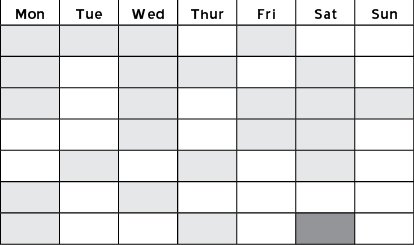An Ordinary Epidemic (52 page)
Read An Ordinary Epidemic Online
Authors: Amanda Hickie

What a stupid, stupid, impulsive thing to do. They should
have waited. It could only be for a couple of days, a week at most. She had chosen not to think it through. Now was too late to realise how foolhardy this was.
They skirted the edge of the boisterous crowd, as if it were a dangerous animalâslowly, keeping an eye on its movement. They had become tourists in their own country, wary of the vibrant, ordinary, everyday danger of life. At the first corner, they took the turn into the relative quiet and safety of a side street.
There were fewer people here, scattered in ones and twos, walking with purpose and keeping to themselves. Halfway down the block it seemed to Hannah as if one of the shopfronts glowed a little brighter than the others. She could hear a choppy jumble of conversation. They slowed their pace, Hannah pulling Sean's arm in a little tighter, the fear of the crowd returning. They stepped off the footpath to walk on the roadway, an extra metre buffer.
As they passed through the light from the restaurant, a woman stepped out, anonymous behind her paper mask. Hannah involuntarily shied.
âYou're welcome to come in. We haven't got a full menu but the chef 's come up with a few dishes from what we have on hand. The Desperation Stew is not bad, considering. It's no mask, no service tonight, so we ask that you keep your mask on unless you're sitting and whenever the waiter comes to your table.'
Inside, half the tables had been taken away, leaving the remaining ones like quarantined islands. Steering a course between them to maintain the greatest distance, the masked staff carried plates and glasses.
âThere's a complimentary glass of champagne for every customer, to celebrate. Until it runs out, then we'll see what's left out the back. It's possible we drank a fair bit of it the last few weeks.'
Hannah felt impolite and shy and touched. âOur kids will be looking forward to your desserts when they're back on the menu.'
Above her mask, the woman's eyes filmed with tears. âYou tell the kids that the second we can get the ingredients, we'll be making puddings again. You tell your kids that.' As they moved away, she suddenly spoke again. âEvery regular I see tonight is someone who is alive. Keep safe. You look after those kids.'

âWhat time is it?'
âYou're the one in front of the computer, Zac.'
The maths books spread across the kitchen table, radiating from Hannah's laptop. At the point of convergence, as if absorbing all their knowledge, sat Zac.
âThe numbers might be up by now.'
âWhat time is it?'
âNine thirty but they were up early yesterday.'
âNot half an hour early.'
Oscar was doing doughnuts around the kitchen floor. âWhat's your guess?'
âIt's not a guess, it's an estimate.' Zac used his superior tone.
âBut you don't know,' Oscar wasn't going to be dismissed, âDad said so, so you guessed.'
âIt's not a guess. A guess is when you make it up. I estimated and I've been right every time. Close enough.'
Oscar stared blankly. âYou didn't tell me your guess.'
âThirty. That's my estimate, thirty. And we can go outside if I'm right, can't we?'
She had never seen him look so full of longing. âI don't know, Zac, it depends.'
âOn what? What does it depend on?'
âLots of things.'
âWhat does it depend on? How can you decide whether we can go out if you don't know what it depends on?'
âIt's not that simple, Zac.'
âYes it is. It is. You tell me what it depends on and then we see the numbers. Otherwise, you're just making up a number that fits in with what you want. You can't keep us inside forever.' Hannah thought she might. âDad, there has to be a number, right?'
âHe's right. We should be able to come up with a number.'
âI don't know...'
âCome on, Mum. Like, ten. If there were ten.'
âThere's not going to be ten.' Sean tried to be the voice of reason. âBe realistic, Zac.'
âI know there's not going to be ten but if there was.'
âFine, then.' She could play this game. âIf there are only ten, you can go outside.'
âWhat about twenty?'
âTwenty, yes. There'll be more than that though.'
âFifty.'
âNo, not fifty.'
âDad?'
âYou wanted a number, your mum gave you a number so live with it.'
âOkay, thirty.' It was Zac's final and desperate offer.
âI don't know.'
âCome on, thirty cases in the whole of Sydney. That's almost half yesterday.'
âTwenty-five. Deaths, not new cases.'
Sean blanched. âYou can't bargain about this, this is actual people dying.'
âZac wants rules, I'm laying down the rules. Twenty-six and we stay inside.'
Zac furrowed his brow and sent her a dirty look. He started mashing the buttons on the computer.
âYou can type all you want, it's still not time.'
He sat back from the keyboard and stared at the screen. âIt was early yesterday.'
She came around behind him. The screen showed yesterday's figures. Two hundred and fifteen new cases, forty-eight dead. The numbers no longer had absolute meaning for her, they were only better or worse than yesterday. Six and a half thousand last week was cause for optimism when you compared it to twenty-five thousand the week before. And yet she knew that six and a half thousand people and their families saw no upside.
âSince when were there less deaths than new cases?'
âHaven't you been paying attention, Mum? There are two curves and deaths go up and down about five days after the infections. There were only more deaths when the infections were coming down and the deaths were still going up. That was, like, two weeks ago.' He rolled his eyes. âDidn't you know that?'
He hit the refresh button, a heavy moment of expectation and then the same figures filled the screen.
âThere's still five minutes to go, Zac.'
He clicked refresh again. It took a little longer to load. âTHE PAGE CANNOT BE DISPLAYED.'
âOh, what?' Zac hammered his frustration on the mouse button.
âHey, be careful of my computer.'
The table's lines appeared in a sputter followed by an unbearable pause. A long moment later, the numbers materialised in place.
âThe same, that can't be right.' Zac was beside himself.
âThat's yesterday's. They've put yesterday's first. This column is today's.' She rested her finger on the top of the next column but it made no sense.
âTwenty-three new cases, twelve dead.' Zac looked up at her confused. âThat's good, right? That can't be right.'
âYou've got it the wrong way round, Monkey.' Sean was leaning over his shoulder. âOnly twelve new cases. In all of Sydney, only twelve.'
âThen I was right, I said thirty and it's twenty-three.'
âBut Zac, only twelve new cases. That's nothing, that's noise.'
âWhere? They might be near here.' There was a catch somewhere. If she wasn't careful, they would let the numbers on a screen lull them into a mistake.
âWhat does it matter where? They could all be on our street, if there's only twelve it's gone.'
Hannah felt agitated and flushed. Somewhere in the details she risked being conned by the data. âClick on them, I want to see where they are. Now, Zac.'
Zac clicked. âSee they're all over the place.'
Sean grabbed her around the waist. âThat's it, it's done.' He pulled her into a hug so tight, she had to breathe deep to loosen it.
She rubbed her cheek against his. âIt's over.'
âSo we can go out, right, we can go out.' Zac had his feet apart planted squarely on the ground.
âWhat, now?'
âYou said twenty-five, it's twenty-three. So we can go out, right now.'
âI guess we can't argue with that.' Sean clapped his hands together. âGet your shoes on. Let's see if we can't find chocolate or an ice cream or,' he turned around to Hannah with a wicked smile, âa cappuccino.'
They scattered, getting ready. The house was filled with insistent, jangling anticipation, like Christmas. She could feel each individual activity, locking doors, putting on shoes, searching out the cleanest shirt, all driving towards one joint moment. She found herself out on the porch, impatient. From inside the house she could hear Sean. âYou can't wear those, for God's sake Oscar, where are your sneakers? Look under your bed, look under the sofa. How can they be lost? You
haven't been out of the house.'
Zac walked out the front door on the balls of his feet, as if they were springs. He stepped down the first stair and then up again. She watched him pace to the footpath and back, measuring the distance with his footsteps. He considered the pavement and then came back to her, his attention still at his feet.
âI think I'll go for a run.'
âWhat about the ice cream? What about coming with us?'
âI'll have an ice cream later. I think I'll go for a run now.' It sounded like a statement but he was waiting for permission.
âWhere are you going?'
âI don't know, not far.'
âDo you want us to bring an ice cream back for you?'
âYeah, if you want. I'll be back soon.' The springs in his legs released and he took off.
Once he was a baby, she was sure of it. She had the memories in her head, although this long straw of a person didn't look anything like the bundle of baby that used to be. When he had first learnt to crawl he would take off, fearless, curious, an explorer. She remembered saying to the baby health nurse, âHe doesn't need me.' And her saying, âHe knows you'll be there.' How strange that realisation was, that the better she did her job, the less he needed her. That was how it was supposed to be. She had survived everything else, she could survive that.
She felt the weight of the ephemeral moment. And then it was gone, unrecorded, irretrievable. She watched Zac's back as he ran. He's never coming back, she thought, not this Zac, not the one that exists right now. Someone else will be here when I get home. Someone who looks and sounds like Zac, who thinks he is Zac, someone I only think I know. And that was goodâshe couldn't wait to meet him.
MY THANKS TO
The people who kept me afloat in 2001âRuth, Debbie, Charles and Janet, who were normal in abnormal circumstances. Mum, who encouraged my child-self to tell herself stories when she couldn't get to sleepâit turns out stories are more compelling than sleep. Dad, who taught me to think and question. My dear friends Maree and Ruth and my sister Cait, who suffered through the early version and made me feel like there was something there. Pam, who gave up very rare spare time to talk me through medical issues. Jodie, who talked me through practicalities. Gordon, for patience, an always-attentive ear, support and encouragement, and the time to indulge my folly.
Anna Solding for plucking me off the pile and pushing me when I needed it. Kim Lock, Peter Cassidy and Lynette Washington for help making this the book that it is.
Also available from MidnightSun Publishing

An intimate tale of searching for peace, this is one woman's struggle to turn the ordinary into something extraordinary.
âA beautifully drawn portrait of a woman seeking empowerment...'
Noni Hazlehurst

